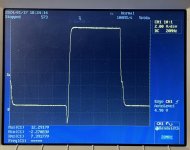You could try changing the transistors in channel 1.
Is the idle current for the other channels constant whether they're hot or cold?
Is the falling side of the PS waveform free if the glitch it had previously?
The transformers in this amp are small. I don't know if going to 25k is going to be a problem. You'll have to drive the amp hard to see if there appears to be anything odd happening when hitting the hard notes.
Is the idle current for the other channels constant whether they're hot or cold?
Is the falling side of the PS waveform free if the glitch it had previously?
The transformers in this amp are small. I don't know if going to 25k is going to be a problem. You'll have to drive the amp hard to see if there appears to be anything odd happening when hitting the hard notes.
I will replace the transistors, i have to get new ones first.
Channel 4 rises slightly, but no comparison to channel 1.
The glitch is gone, i think...I'll check it again tomorrow.
The transformers are getting hotter than before. I measured 60 degrees celsius, but at 4a idle.
after each repair 🙂 not quite like in your tutorial but very similar
Channel 4 rises slightly, but no comparison to channel 1.
The glitch is gone, i think...I'll check it again tomorrow.
The transformers are getting hotter than before. I measured 60 degrees celsius, but at 4a idle.
You'll have to drive the amp hard
after each repair 🙂 not quite like in your tutorial but very similar
With the PS, I wanted to know if the frequency was normal and Ultra posted that he had seen it. OK.
There were a couple of things that concerned me and one was the glitch in the falling side of the drive. I don't know if the supply is regulated or not. It didn't appear to be in regulation from the waveforms you posted.
Were the PS FETs heating up at idle before you replaced the capacitor to lower the frequency?
There were a couple of things that concerned me and one was the glitch in the falling side of the drive. I don't know if the supply is regulated or not. It didn't appear to be in regulation from the waveforms you posted.
Were the PS FETs heating up at idle before you replaced the capacitor to lower the frequency?
The PS is not regulated.
No. The PS FETs and the output transistors still cold.
Were the PS FETs heating up at idle before you replaced the capacitor to lower the frequency?
No. The PS FETs and the output transistors still cold.
OK. You may go back to the previous oscillation frequency, especially if the transformers are heating up.
Running the 3205s at twice the expected frequency may need a reduction in the gate resistor value but if they were running cool at idle and the supply isn't regulated, it wouldn't be absolutely necessary.
What B+ supply voltage are you getting at the B+ and ground terminals? The drain amplitude seemed a bit high.
If you have the full tutorial and didn't download a recent version, email me.
Running the 3205s at twice the expected frequency may need a reduction in the gate resistor value but if they were running cool at idle and the supply isn't regulated, it wouldn't be absolutely necessary.
What B+ supply voltage are you getting at the B+ and ground terminals? The drain amplitude seemed a bit high.
If you have the full tutorial and didn't download a recent version, email me.
You may go back to the previous oscillation frequency, especially if the transformers are heating up.
If the spare parts are there i'll try ~35k, otherwise i'll go back up to 50k.
What B+ supply voltage are you getting at the B+ and ground terminals?
As set on the laboratory power supply unit.
The picture shows the Gate now. Glitch is disappeared, but another phenomenon was added.
Attachments
I don't see that as a problem.
Are you grounding the scope probe to the source leg of the FET? Sometimes, a difference in ground points can make a difference in what you see on the scope.
Are you grounding the scope probe to the source leg of the FET? Sometimes, a difference in ground points can make a difference in what you see on the scope.
- Home
- General Interest
- Car Audio
- ESX Quantum QE 900.4 continuously draw current
